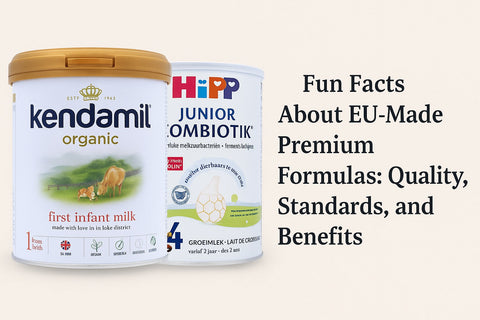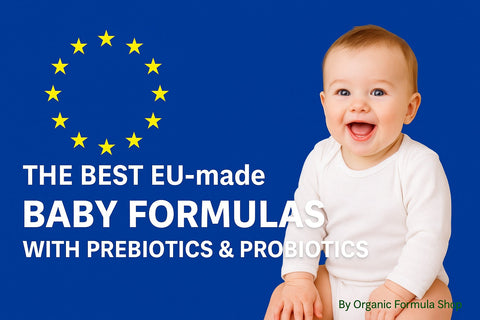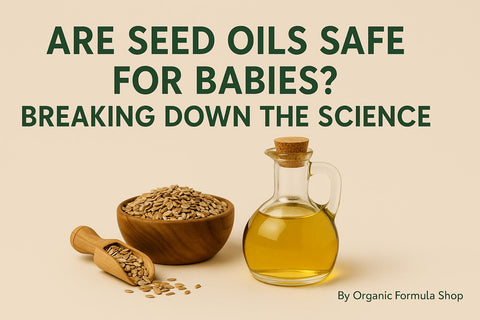Quick Guide to Vegetarian Baby Formulas
Vegetarian baby formulas are gaining popularity as more families embrace plant-based lifestyles. These formulas stand out because they include dairy but use plant-based DHA sources like algae, making them an excellent middle ground between regular and vegan options.
In this guide, we’ll cover:
- Differences between regular, vegetarian, and vegan formulas
- The importance of DHA for infant development
- Advantages of vegetarian baby formulas
- Recommended vegetarian formulas for each age group
How Do Regular, Vegetarian, and Vegan Formulas Differ?
Vegetarians and vegans differ in their dietary restrictions and lifestyle choices. While both avoid consuming meat, vegans adhere to stricter guidelines, eliminating all animal-derived products. Here's a breakdown of their differences:
-
Vegetarians:
- Avoid meat, poultry, and seafood.
- Consume animal byproducts like milk, cheese, yogurt, eggs, and honey.
- Non-food items like leather and wool may be used.
-
Vegans:
- Avoid all animal products, including dairy, eggs, and honey.
- Generally, don't use products made from or tested on animals, such as leather, wool, or certain cosmetics.
Regarding infant formulas, vegetarian formulas align with vegetarian principles by using animal-derived ingredients like milk but replacing fish-based DHA with plant-based sources. Vegan formulas, on the other hand, are entirely plant-based, avoiding milk, lactose, and any other animal-derived ingredients, making them a suitable choice for families following a strictly vegan lifestyle.
Understanding these formula types can help you choose the best option for your baby:
| Milk Type | DHA Source | Key Features |
|---|---|---|
| Regular Formula | Fish oil | Includes animal-derived DHA, widely available |
| Vegetarian Formula | Plant-based algae | Dairy-based, avoids fish oil, vegetarian-friendly |
| Vegan Formula | Typically none | 100% plant-based, excludes all animal products |
Vegetarian formulas use plant-based algae for DHA, providing a sustainable and allergy-friendly alternative to fish oil used in regular formulas. Vegan formulas, on the other hand, are entirely free from animal products, often leaving out DHA altogether.
Why DHA Is Essential for Babies
DHA (docosahexaenoic acid) is an omega-3 fatty acid vital for infant growth and development. It is naturally present in breast milk, fish, and algae.
Key roles of DHA include:
- Brain Development: DHA supports the frontal lobes, which are responsible for cognitive activities like focus, planning, and problem-solving.
- Vision Health: DHA is abundant in the retina, optimizing visual function and protecting against damage from oxidative stress.
Infants depend on a formula to meet their DHA needs if breast milk is not an option, making vegetarian formulas with plant-based DHA an excellent choice.
Benefits of Vegetarian Baby Formulas
Switching to a vegetarian baby formula can provide numerous health and lifestyle advantages:
- Supports a sustainable lifestyle: Algae-based DHA is eco-friendly and cruelty-free.
- Allergy-friendly: Avoids fish oil, a common allergen in standard formulas.
-
Promotes long-term health: Vegetarian diets are associated with:
- Lower risk of chronic illnesses
- Reduced inflammation
- Lower blood sugar and pressure
- Healthier body weight and BMI
Parents can align their baby’s nutrition with their family’s values by introducing vegetarian formulas early.
Top Vegetarian Baby Formulas
Stage 1 Infant Formulas (Birth–6 Months)
For newborns, these formulas provide complete nutrition and are ideal as a breast milk alternative or supplement:
-
Kendamil Organic Cow Formula Stage 1

- Made from Organic whole milk
- Free from palm oil, soy, and maltodextrin
- Supports brain development and gut health
-

- Demeter-certified for superior organic standards
- Contains natural whey, DHA, and Omega-3
- Free from palm oil, starch, and synthetic additives
-
- Suitable for premature and newborn babies
- Free from maltodextrin, palm oil, and GMOs
- Enriched with vitamins A, C, D, and calcium
Stage 2 Follow-On Formulas (6–12 Months)
Designed for older babies transitioning to solids, these formulas offer balanced nutrition:
-

- Organic-certified with natural whey and plant-based DHA
- Ideal for 6–12 months
-
- Made from whole goat milk with natural prebiotics
- Free from starch, maltodextrin, and synthetic fillers
-
- Packed with Omega-3 and Omega-6 for brain and eye health
- No palm oil or soy
Stage 3 Toddler Formulas (12+ Months)
For toddlers needing additional nutrients, these vegetarian options provide essential vitamins and minerals:
-

- Supports growing toddlers aged 10+ months
- Free from palm oil and synthetic fillers
-
- Whole milk based with algae DHA for brain development
- Prebiotics for digestive health
-

- High-quality goat milk with DHA and ARA
- No starch, maltodextrin, or GMOs
Why Choose European Vegetarian Baby Formulas?
European baby formulas are renowned for their high standards and clean ingredients. Brands like HiPP, Holle, and Kendamil follow stringent regulations set by the European Food Safety Authority (EFSA) to ensure:
- Organic and non-GMO ingredients
- Free from artificial additives, sugars, and fillers
- Eco-friendly and sustainable production
Choosing European vegetarian formulas provides peace of mind and ensures your baby gets the best nutrition.
Let Us Help You Choose
Need assistance selecting the perfect vegetarian formula for your baby? Our team is ready to guide you through the options to meet your family’s needs. Please shoot us an email at support@organicformulashop.com.
Remember, We Offer the Fastest & Free 2-4 Biz-Days Shipping to the US. Order Now! 🌿👶
Disclaimer: This article is for informational purposes only and should not replace professional medical advice. Always consult your pediatrician to determine the best formula for your baby’s unique needs.








